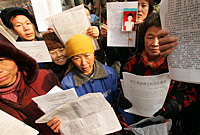




HONG KONG—Authorities in the Chinese capital have formally charged a social activist who applied for a permit to stage a mass demonstration on Tiananmen Square to highlight the plight of thousands of ordinary people whose complaints against official wrongdoing have gone unheard.
Several Beijing newspapers carried a brief report recently, saying prosecutors had charged a “petitioner surnamed Li from Xinjiang” with inciting people to march on Tiananmen Square, local residents and petitioners told RFA.
They said the report probably referred to Li Xiaocheng, who “disappeared” following the crackdown on the demonstration, which had been planned for Aug. 7, 2004.
“Yes, I think that’s probably right,” Beijing petitioner Li Yulan told RFA’s Mandarin service. “There was a Li Xiaocheng on the handout calling for the demonstration. I think he was tricked into detention by someone posing as a newspaper reporter and taken away.”
A former People’s Liberation Army (PLA) officer from the northwestern region of Xinjiang, Li Xiaocheng submitted a demonstration permit application to Beijing municipal public security bureau two days ahead of the planned march.
He has not been seen by petitioners since. The march fell apart after key organizers were detained and security tightened in the streets of the capital.
There are even more [police] than before...For a few days after the regulations came out, around May 10, say, there weren’t so many vehicles. But now there are vehicles from all over China. Shandong, Liaoning, Heilongjiang. The police of all the provinces seem to be here.
Concern has been growing over Li Xiaocheng’s fate among petitioners in the capital, with one petitioner expressing fears in a March interview RFA that he might have died in police custody.
Fellow activist Ye Guozhu was sentenced to four years’ imprisonment for “stirring up trouble."
Meanwhile, petitioners continued to flock to complaints offices of central government departments in Beijing, despite new regulations issued May 1 that aimed to force local governments into addressing complaints in their own localities.
“There are more and more petitioners nowadays. Recently there’s been a new wave of recent evictees from Beijing and the provinces, all over,” Beijing resident Li Yulan told RFA’s Mandarin service.
“The authorities have been taking people away from the Central Commission for Discipline Inspection by the busload. They take them to [a reception center in] Majialou [a southwest suburb of Beijing]. There are around 100 people in each bus.”
Beijing petitioner Hua Huiqi was asked if the security presence from other provinces had tailed off since the regulations ordered local governments to respond to their own people.
“There are even more than before,” he told RFA reporter Lin Di. “I’ve actually done a little research on this, because my home is nearby. For a few days after the regulations came out, around May 10, say, there weren’t so many vehicles. But now there are vehicles from all over China. Shandong, Liaoning, Heilongjiang. The police of all the provinces seem to be here,” Hua said.
China’s leaders have said publicly that they believe the majority of petitioners to be pursuing valid complaints against local officials.
There are more and more petitioners nowadays. Recently there’s been a new wave of recent evictees from Beijing and the provinces, all over...The authorities have been taking people away from the Central Commission for Discipline Inspection by the busload.
But lack of judicial independence and rampant corruption and protectionism have forced people to seek redress from central government in Beijing, experts say.
“The reason you’ve got so many people taking their complaints to Beijing is the localization of the judiciary. That’s to say, the judiciary is tied up with interests of local governments,” Li Jian, editor of the Web site “Rights Protection Bulletin,” said during a panel discussion on RFA’s Mandarin service.
“This has two effects. One is that you’re not going to get a fair hearing. The other is that the judiciary will not act. Most of the petitioners you meet in Beijing are there because they tried to take their cases through the local courts but met with failure,” Li told RFA reporter Shen Hua.
Independent current affairs commentator Zeng Ning said the problem went right down into the roots of China’s authoritarian political system.
“China is facing a multitude of social problems of every imaginable kind,” said Zeng, who is based in the southern Chinese province of Guizhou.
“The only way you are going to alleviate the sufferings of ordinary Chinese people is by establishing a democratic society which serves their interests. At the moment what you have is an authoritarian system with political power coming from a single source."
What gives the authorities cause for concern is that many of China’s petitioners do not fit the expected mold of trouble-maker and activist. Indeed, many would once have been regarded as members of the Party elite.
One elderly petitioner, surnamed Wang, expressed bewilderment after being forbidden to sing the communist anthem, the Internationale, by police.
“I was a soldier in the PLA for 20 years. I first joined up December 1969, when I was just 15 years old,” Wang told RFA.
“I joined the Chinese Communist Party in 1973. I said, 'Why won’t you let me sing it? Since when was it a crime to sing the Internationale? It’s the song of the Party.'"
Original reporting by RFA's Mandarin service. Service director: Jennifer Chou. Translated and produced for the Web by Luisetta Mudie and Sarah Jackson-Han.